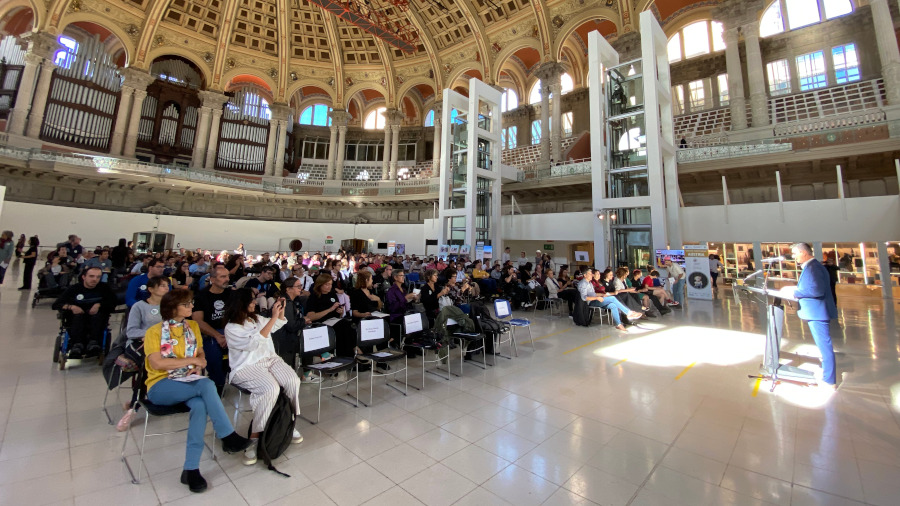European project brings art to people with disabilities in inclusive contexts
The project, presented at the MNAC and coordinated by the UAB, has led to the development of a guide for the construction of inclusive cultural spaces and a documentary to give visibility to participatory processes between people with and without disabilities in inclusive contexts of artistic creation.

On Friday 27 October, the research group at the Centre for Studies and Research for an Inclusive Society (CERSIN) at the UAB presented at the Oval Room of the National Art Museum of Catalonia (Museu Nacional d’Art de Catalunya, MNAC), the results of the INARTdis project, an initiative at European scale that aims to bring art and culture closer to people with and without disabilities as a means of social inclusion within collaborative spaces of artistic creation.
Josep Maria Sanahuja, lecturer in the Department of Applied Paedagogy and director of CERSIN at the UAB, presented the project as a challenge “to give a voice to all people, with or without disabilities, by including them in different artistic projects. The goal is to bring art and culture closer to people and improve social inclusion through artistic creations”. Sanahuja highlighted that the utmost goal was to achieve “a cohesive interrelation between educational and cultural contexts”.
Josep Serra, director of the MNAC, pointed out that “putting the visitor at the centre of the museum is a priority”, while he also emphasised the suitability of this project, which will be an opportunity to “apply in detail these aspects for all new projects at the museum”. Sílvia Duran, director of the Public Area of the Catalan Institute for Cultural Companies, considered that “the project will guide us in changing how we cater to diversity in our population”. For Duran, “we must make culture a necessity, and this project shows us the way to make it possible”.
The presentation also included a speech by Lluís Torrens, secretary of Social and Family Affairs of the Catalan Ministry for Social Rights, who considered the project “a paradigmatic case of what should be done, since it is vital that access to culture be equitable”. UAB Secretary General Esther Zapater ended the presentation by congratulating the CERSIN research group for having met the objectives of their project and remoinded them that diversity and social inclusion “are in the DNA of the UAB, since a diverse society is a rich society and this makes us evolve”. Secretary Zapater listed three challenges yet to be met: "working towards cognitive accessibility, beyond what is physical accessibility, empowering a person so that they can advance in their life's path, and conducting coordinated actions among institutions to find solutions to these challenges”.
The project, which also included the participation of Mar Morón, lecturer in the Department of Teaching of Musical, Artistical and Corporal Expression and member of CERSIN at the UAB, put people from 32 socio-educational institutions, according to their needs and interests, in contact with 34 artistic and cultural institutions across Europe. The initiative gave way to the creation of a guidebook entitled Guide to Building Inclusive Cultural Spaces, a document to aid in the creation of inclusive spaces which will allow cultural institutions to evaluate their degree of inclusion of all people.
The event featured the premiere of the documentary on inclusive creative spaces Venim a crear. Institucions culturals per a tothom, an audiovisual journey through the different creative processes that have taken place in the six venues of the INARTdis project, with more than eighty cultural and socio-educational institutions involved in Germany, Austria, Cantabria, Catalonia, North Macedonia and Portugal, documented by the renowned filmmaker Cecilia Barriga.
In an exhibition space organised in the oval room of the MNAC, the artistic projects carried out in the different venues were presented, followed by a fashion show of diverse and vindicative fashion, the result of one of the project's actions, where people with disabilities participated in the creation and design of garments adapted to their needs.
In addition to CERSIN of the UAB, the coordinating centre of the project, the following institutions participate in the consortium: Pädagogische Hochschule Steiermark (Austria), Association for Promotion of Education, Culture, and Sport "Education for all" Skopje (North Macedonia), Thikwa Werkstatt für Theater und Kunst der Nordberliner Werkgemeinschaft gGmbH / Nordberliner Werkgemeinschaft gGmbH (Germany), Instituto Politécnico de Lisboa (Portugal), and Universidad de Cantabria (Spain).
The project, which ends this November, began in 2020. During this period, the different needs of cultural and educational centres have been detected regarding the value of art in the generation of inclusive and participatory spaces to promote social inclusion, and coherent and participatory training actions and artistic creation projects have been designed, implemented and evaluated based on collaborations among all the agents involved, with the active participation of both professionals from educational and cultural institutions and people with and without disabilities.
In Catalonia, a total of 12 educational and socio-educational centres and artistic and cultural institutions - involving the participation of more than 150 people - are actively collaborating in this project: Escola de la Mar, Barcelona, Vallbona d'Anoia Institute, Costa i Llobera Institute, Rel School, Aspasim Foundation, Aspace Foundation (Badalona), Talleres Bellvitge, Museu Nacional d'Art de Catalunya (MNAC), Museu del Disseny de Barcelona, Museu Can Framis - Fundació Vila Casas, Teatre Nacional de Catalunya (TNC) and Mercat de les Flors - Casa de la Dansa.
For more information please visit:
INARTdis project website
https://inartdis.eu/
Guide to Building Inclusive Cultural Spaces
https://inartdis.eu/descarga-catalan/
Erasmus+ INARTdis Project (Fostering social inclusion for all through artistic education: developing support for students with disabilities). 621441-EPP-1-2020-1-ES-EPPKA3-IPI-SOC-IN
The UAB, with Sustainable Development Goals
Good health and well-being
Reduced inequalities
Quality education
Partnerships for the goals